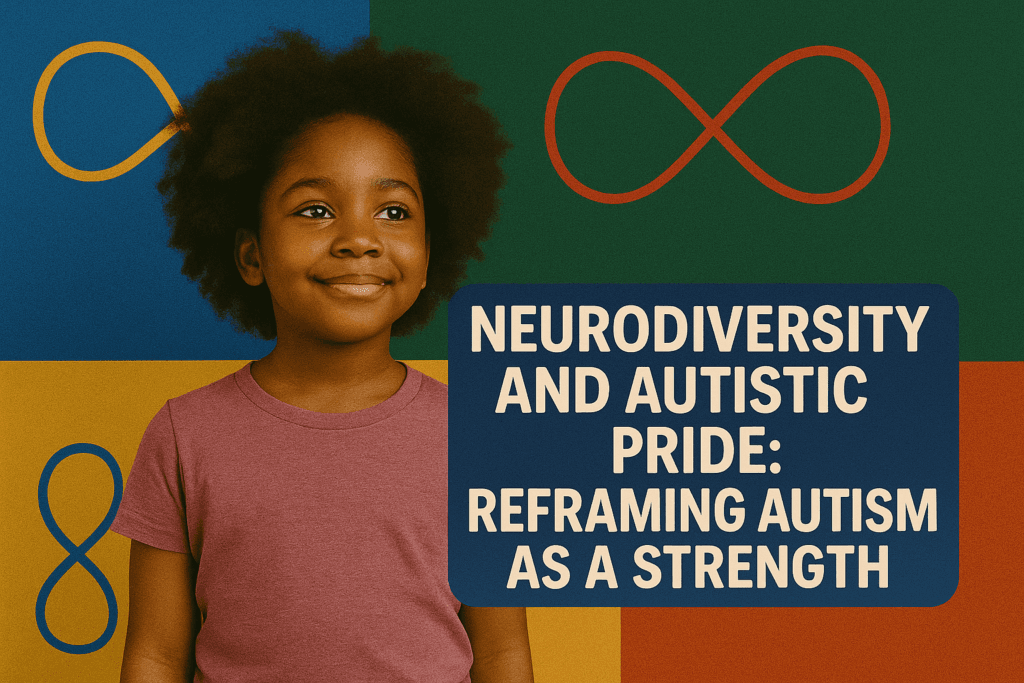💡 Introduction: What Is Neurodiversity?
The concept of neurodiversity challenges the traditional view of autism and other neurological conditions as purely “disorders” that need to be fixed. Instead, it promotes the idea that differences in neurological wiring—like autism, ADHD, dyslexia—are simply variations of the human brain. 🌍🧠
Coined in the 1990s by sociologist Judy Singer, neurodiversity is a powerful term that reframes how we perceive individuals on the autism spectrum. Instead of viewing autistic people through a lens of deficit, the neurodiversity movement embraces them as valuable contributors to society—with unique skills, talents, and perspectives. 🌟
🚩 Moving from Deficit to Diversity
Historically, the dominant narrative about autism focused on what autistic people couldn’t do—struggles with communication, sensory overload, or rigid behaviors. But this is only one side of the story.
The neurodiversity model shifts focus toward:
- 🧩 Unique strengths and talents
- 🎯 Enhanced attention to detail
- 🔁 Passion for routines and deep interests
- 🧠 Advanced pattern recognition
- 💡 Original problem-solving approaches
This view encourages inclusion, accessibility, and acceptance—key goals of autistic pride.
🏳️🌈 What Is Autistic Pride?
Autistic Pride Day, celebrated every year on June 18, was inspired by the LGBTQ+ pride movement. It emphasizes that autism is a difference, not a disease, and it’s something to be proud of—not ashamed of. ✨
Just like LGBTQ+ pride seeks equal rights and celebration of identity, autistic pride calls for:
- Recognition of neurodiverse identities
- Respect for autistic communication styles
- Empowerment through self-advocacy
- Safe spaces for neurodivergent individuals
🎉 The rainbow infinity symbol ♾️ is often used to represent infinite variations in neurodiversity.
🎙️ Voices of Autistic Self-Advocates
Autistic self-advocates are leading the way in redefining autism. Organizations like the Autistic Self Advocacy Network (ASAN) and individuals like Temple Grandin, Dr. Devon Price, and Naoki Higashida are changing the narrative.
They emphasize that autism is a lived identity—not a tragedy.
“I am different, not less.” — Temple Grandin
These voices promote understanding that autism is an integral part of identity, not something to be separated from the person.
🧑🏫 Strength-Based Education & Employment
Traditional systems often fail autistic individuals by focusing only on challenges. A strength-based approach recognizes talents such as:
- 🧮 Excellence in math, coding, or science
- 🎨 Artistic or musical creativity
- 📚 Passionate knowledge in niche subjects
- 🔍 Meticulous attention to detail
👩💼 In workplaces, inclusive hiring initiatives like Microsoft’s and SAP’s Autism at Work programs have seen increased productivity and innovation by embracing neurodiverse talent.
🌍 Global Movement: Neurodiversity in Action
The neurodiversity movement is gaining traction worldwide:
- Educational Reforms: Schools are introducing inclusive teaching methods, sensory-friendly environments, and UDL (Universal Design for Learning).
- Media Representation: Shows like Atypical, The Good Doctor, and Everything’s Gonna Be Okay feature autistic characters in nuanced roles.
- Corporate Inclusion: Tech giants, startups, and government agencies are tapping into neurodivergent potential.
This global shift reflects a growing acknowledgment that different does not mean defective.
🎨 Celebrating Autistic Culture & Identity
Autism is not only a diagnosis—it’s a culture with its own norms, language, humor, and aesthetics. The autistic community shares:
- 📣 A preference for direct communication
- 🛑 Lower tolerance for social pretenses
- 🎧 Sensitivity to sensory environments
- 🧠 Deep emotional insight
💬 Online communities like Reddit’s r/Autism and #ActuallyAutistic on Twitter/X provide vital platforms for sharing experiences and building community pride.
❤️ Support Autism Wings Inc.
At Autism Wings Inc., we believe in creating holistic support systems for children with autism—including nutritional education, therapy, and soon, a dedicated school! 🏫🧒
We’re currently raising funds to build a specialized Autism School that nurtures every aspect of development. Your contribution can change lives.
👉 Donate Now
🌐 Visit Our Website
🧭 Future of Neurodiversity: What Needs to Change?
To fully embrace neurodiversity, society must work on:
- 🧑⚕️ Better training for healthcare professionals
- 🏛️ Inclusive education policies and teacher support
- 🤝 Employment programs that match strengths
- 🏠 Housing and independent living supports
- 💬 More platforms for autistic voices
Acceptance isn’t enough—inclusion and empowerment must follow.
💬 Final Thoughts: A Strength, Not a Stigma
Neurodiversity and autistic pride encourage us to look beyond stereotypes and see the whole person. By reframing autism as a natural human variation, we move toward a world that values differences as strengths, not deficits.
✨ Let’s build a future where every autistic individual can thrive, express, create, and contribute—on their own terms. ♾️💖

